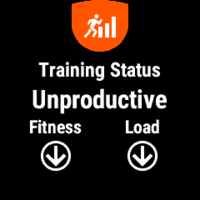Overtraining. It might be my middle name. Kidding, kind of. I have been running for 20+ years and have had more than 20 injuries, for sure. I bring up the topic because I see it often, I have done it often and I’m working on a race season of staying healthy and training smart. (Pretty sure you are, too)! When most people think of the drawback to overtraining, injury is the first to come to mind. But there are actually some other drawbacks to overtraining you may have experienced or may be experiencing now. Hopefully, you haven’t and are just one of those people who trains smart all the time and your body responds accordingly, but something tells me if you are reading this, then you’ve overtrained or worried you may be about to. (ugh I hate ending sentences in prepositions! But I digress…) Anyhow, the following are other things to consider when you want to push through 8+ days of non stop training….

1. Muscles can only repair when given rest. Tiny tears that happen when lifting or repetitive use won’t have a chance to heal thus leading to a decrease in strength/failure for muscles to grow and greater incidence of injury.
2. Your weight loss may plateau (or you may gain weight). More exercise can cause an increase in appetite and often we intake more than we think we do as endurance athletes. The chronic stress on your body can cause an increase in cortisol, resulting in weight gain/plateau.
3. Sleep and mood changes. If you’re noticing your snappier and are having a hard time sleeping, often times, look at your training schedule. The culprit may lie in the fact that your overtaxing your body and your hormone levels and sleep patterns have changed due to the stress.
4. Immune system issues. Overtraining raises inflammation/lowers immunity. When overtraining, your body’s digestive organs and reproductive organs can be affected, altering them from their normal function. Your menstrual cycle may stop or be irregular or men, your testosterone levels may be decreasing. Libido may also take a nose dive. Dizziness, fatigue, nausea, or increased resting heart rate may also be signs. Overtraining can even affect your adrenal system and lead to insufficiency as your adrenal glands are unable to keep up with the body’s natural fight-or-flight response.

WHAT TO DO ABOUT IT?
So does that mean you should stop working out hard or long? No! But if you’re experiencing some or all of these, you may want to talk to your coach, or look at your plan and adjust. Introduce a recovery day or days (complete days of rest) each week. Every fourth week, for example, lower both the volume and the intensity of each workout. Or choose two days of the week, such as Sunday and Wednesday, in which you perform only light recovery exercise. This type of strategy is common among athletes, who call it “periodization. Also, remember the end goal! Are you training for a big race or event? Many times, we worry so much about “hitting” our training that we forget that we really want to nail the race! (I blogged about that here: Do You Never Make It to the Race?). And remember, all the people you see on social media (this one is hard for us all) or in magazines or even you’re uber-talented friends are not YOU! Your body, your training. If we were all the same, then there wouldn’t be a million types of training plans and ways to train! Find what works for you, and don’t fall victim the overtraining bug. Afterall, it’s no fun to watch from the sidelines!
Have you experienced any of these symptoms? Or any different ones I didn’t mention? Comment below, I’d love to hear!
XOXO,
Jess

REFERENCES:
- Axe, Josh, MD “Is Less More When It Comes to Exercise? 8 Risks of Overtraining.” Dr. Axe
- Hilton Anderson, Charlotte. “Overtraining: 9 Reasons to Skip Your Workout … Sometimes.” Shape.
- Greenfield, Ben. “All About Overtraining.” Training Peaks




These are all such important things to keep an eye out for! Great post!